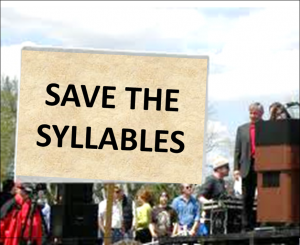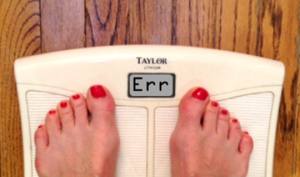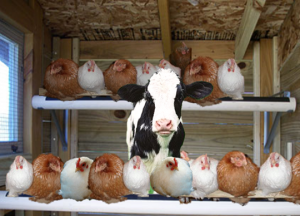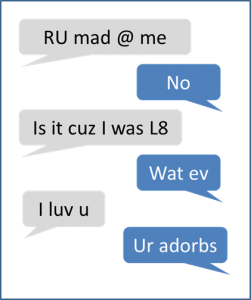Rebecca Lyles's Blog, page 7
June 6, 2015
Flubtitles
 The technology has various names, including captioning, subtitles, and speech-to-text. It makes video accessible to those with hearing impairments or language difficulties. But even native English speakers with good hearing sometimes use on-screen captions.
The technology has various names, including captioning, subtitles, and speech-to-text. It makes video accessible to those with hearing impairments or language difficulties. But even native English speakers with good hearing sometimes use on-screen captions.
Select TV closed captioning to watch a movie while someone else sleeps. If your phone rings during the baseball game, mute the sound, turn on captions, and follow the game while continuing your conversation. Or read the subtitles with the sound on when those fast-talking actors with heavy accents are hard to understand.
Sometimes it’s just plain entertaining. Screen text works best when the titles are prepared from a known script and edited before production. But with live action, neither the transcriber nor the language robot knows what’s coming next. With no time to edit, that’s when it happens — flubtitles.
My sympathies to anyone who truly needs subtitles to understand what’s going on. With human error, autocorrect, idiomatic speech, and the hundreds of homophones in the English language, disaster is inevitable.
Here are some of my favorites from actual TV news broadcasts (and their translations):
HISTORICALLY GANG ACTIVITY WAS BETWEEN THE BLOODS AND THE CRYPTS
Crips, not underground burial chambers. Although—how cool would it be if Los Angeles had catacombs like Paris!
HE WAS TAKEN TO THE HOSPITAL AND PRONOUNCED DEBT
They meant dead, but I guess they determined he wasn’t going to pay either way.
I WAS AGAINST THIS INVESTMENT FROM THE GECKO
One can only hope he meant get-go, and not that insurance cartoon reptile.
So if you depend on captions to understand, and any of these appear on the TV screen, do not panic:
BANKS WILL BE CLOSED FOR THE HOLLANDAISE
POWER NOW GENERATED BY WIND TURBANS
MAYOR SUPPORTS CITY’S RABID TRANSIT SYSTEM
Before sounding the alarm that banks are now making sauce, clean energy comes from headgear, or the trains are infected with hydrophobia, you might want to check a second source.
Like TextCPR on Facebook !
May 30, 2015
The online tutorial drinking game
 First, I’m not advocating drinking games here. They’re silly and hazardous to your health. What a juvenile activity—sipping booze every time you hear a certain phrase in a movie or TV show!
First, I’m not advocating drinking games here. They’re silly and hazardous to your health. What a juvenile activity—sipping booze every time you hear a certain phrase in a movie or TV show!
Still, I can understand why they exist, aside from being an excuse to drink. A repeated word or phrase can become so distracting it totally eclipses the main event. I remember a college professor who loved the word particularly. He liked the sound of it so much he slowly articulated all five syllables, savoring it on his tongue as if it were fine chocolate.
Obviously, drinking was not allowed in the classroom. So during his lectures, we began to record one hash-mark every time he said particularly. After class, we compared numbers—I think the record was 32. He was so pleased to see us hanging on his every word and writing in our notebooks that he never realized we had zero idea what he was talking about.
Drinking games exist to make fun of overused words, phrases, or actions that draw attention from the real subject. And that brings me to the subject of online tutorials.
There’s nothing wrong with the idea of online tutorials. They show us how to do things, for example with software, that we could never figure out for ourselves. At least not from the icons on the screen or from the unreadable, or non-existent, documentation. And anyone, it seems, can make an online tutorial.
Just be aware that if you create a tutorial with a perky narrator who sounds like Alvin and the Chipmunks on speed, your audience might want to slow things down with a drinking game. And if you just want to play a drinking game with someone else’s tutorial, I suggest listening for these overused phrases:
simply
We get it. This is easy. You want us to be confident. “So you simply set up the preferences, then simply create a profile, then simply make a few small adjustments, and simply send it to your mailing list. Now we’re going to simply find the solution to the Schrödinger equation for the hydrogen atom in arbitrary electric and magnetic fields.” Saying simply doesn’t make it simple.
go ahead and
As if you think we’re poised over our keyboards, afraid to touch them for fear of electrocution. “Go ahead and enter your password, then go ahead and log in, then go ahead and click Next. Now we’re going to go ahead and start, then we’ll go ahead and click on the arrow.” This is not bungee jumping off the Tacoma Narrows Bridge.
you guys
“So OK you guys, here’s a cool way you guys can make a newsletter. Just insert whatever branding you guys use, with the color scheme of [my favorite] you guys’s logo.” I won’t even get into the issue of gender references. Just leave off the guys.
Disclaimer: This drinking game will not make the tutorial any clearer. If necessary, the audience can simply just go ahead and run the tutorial again. They still might not understand it, but you guys won’t care … and neither will they.
Like TextCPR on Facebook !
May 23, 2015
Jackalopes and mermaids
Mermaids are (allegedly) half fish, half human. Jackalopes are half jack rabbit and half antelope. That is, cleverly constructed taxidermy “evidence” has convinced an amazing number of people they actually exist. Throughout the American southwest you’ll find curio shops full of picture post cards and other trinkets depicting the rabbit with antlers. As for mermaids, all I have to say is “Disney.”
This happens to words too, when we need a new name for something that’s neither one thing or another – but both. We combined smoke and fog to create smog. Motor and hotel became motel. And who doesn’t love that plastic spoon/fork doo-dad called the spork?
They’re called portmanteau words. Many became accepted into common usage and found their way into dictionaries. But listen up, folks: That doesn’t mean we can all just make them up on the spot, not even in radio ads or interviews.
1. An attorney says action will be taken summerarily.
If he’s trying to combine summarily (at once) and temporarily, that makes less sense than a rabbit with antlers. It’s not even a word.
2. Roofing company owner says an expert goes to the property to surmise the situation.
Sounds like an attempt at joining survey with hmmm…. what? Appraise? Apprise? Advise? Analyze? At least surmise (decide or assume) is a word, just not the right one for this sentence.
3. Police officer says the suspect’s girlfriend was unable to co-oberate his alibi.
Not only could she not corroborate it, she was not being corroperative.
This is a case of What Happens when inexperienced people face microphones and become tongue-tied. Consonants move around unpredictably, creating garbled syllables that sort-of-sound like real words.
So how do you prevent this from happening to you? Keep it simple. People who go all polysyllabic are more likely to lose their balance. All three of these speakers wanted to sound smart, but instead they sounded foolish.
The lawyer could have said right away.
The roofer could have said size up.
The cop could have said confirm.
Mermaid and jackalope words are most likely to happen in speech. But be forewarned—if you ever write one, some reader will challenge you to prove it exists.
I hope you know a good taxidermist.
Like TextCPR on Facebook!
P.S. Thanks to Jean in Washington for two of these examples!
May 16, 2015
Useful insult words
 Do you ever wish there were more words to describe someone so infuriating and reprehensible that ordinary insults won’t do? I’m not including serial killers or terrorists – they’re in a special category of their own.
Do you ever wish there were more words to describe someone so infuriating and reprehensible that ordinary insults won’t do? I’m not including serial killers or terrorists – they’re in a special category of their own.
I mean the newsmakers who lie, abuse power, and squander our money. They’re on the TV news so much that the line between real news and comedy has all but disappeared. Some of them hold public office. Others just threaten to run for office. Either way, they push our vocabularies to the limit as we shout back at the TV. (Or am I the only one who does that?)
Swear words lost their impact long ago. Relaxed obscenity standards now allow almost anything in prime time. And if you were interviewed on camera and stepped over a line, they would just bleep the sound anyway.
No, it’s time to revive some colorful and archaic words you probably don’t even know about. Although the origins of these words are cloudy, they share a certain fresh nastiness because they’ve not been overused. They sound like characters from a Dickens novel, but you must admit they make pretty imaginative put-downs:
Mumpsimus
Sticking to a belief or practice in the face of incontrovertible evidence that it is wrong. For example, someone who insists on ordering expresso or introducing bills declaring the earth to be flat. (“Look out the window – cornfields as far as the eye can see. Can’t grow corn on a basketball!”)
Slubberdegullion
A filthy, slobbering, worthless, villainous wretch.
Pettifogger
An underhanded or disreputable legal practitioner who deals with petty cases or quibbles over trifling matters.
Snollygoster
An unscrupulous person who will do anything to get elected, regardless of principles or allegiance to a platform.
You probably can’t use any of these to win at Scrabble because they have too many letters. But just once, I’d like to hear a candidate in a political debate say, “What a mumpsimus! You, sir, are nothing but a slubberdegullionous, pettifogging snollygoster!”
As meanwhile, in the control room, someone asks, “So … do I bleep that or what?”
Like TextCPR on Facebook!
May 9, 2015
Write like you mean it
 Like you mean it. This trendy expression has popped up in advertising and social media like a plague of mushrooms. Purists – let’s forget for a minute that many would correct it to “as if you mean it.” The worst thing about it is the implication. If you don’t do what the ad tells you, you’re a slacker.
Like you mean it. This trendy expression has popped up in advertising and social media like a plague of mushrooms. Purists – let’s forget for a minute that many would correct it to “as if you mean it.” The worst thing about it is the implication. If you don’t do what the ad tells you, you’re a slacker.
So how can you make sure to do everything like you mean it?
Eat like you mean it
Stuff an obscene amount of meat, bread, cheese, and drippy sauce into your mouth all at once. Anything else is phoning it in. A reasonable amount of food you can eat like a civilized person is – well – eating like you don’t mean it. (By the way, that model is just pretending to mean it.)
Vacation like you mean it
Take your family to an expensive theme park instead of going camping. For the same amount of money you could take them all to Europe … but then your children would grow up emotionally scarred. Picture them years later in handcuffs, being interviewed on Dateline. “My parents took me to Paris and Firenze, but they didn’t mean it.”
Shop like you mean it
Go to the biggest mall you can find and load yourself down with bags of designer clothing and shoes. Put it all on your maxed-out credit cards and worry about it tomorrow. And for Pete’s sake, don’t patronize small, local businesses where no one will see you carrying those high-end shopping bags. No exposure there. What’s the point?
If doing everything with total commitment and gusto is such a good thing, there should be signs in gyms that say Exercise like you mean it. How about libraries? Read like you mean it. And this one should come with every personal computer:
Write like you mean it
Re-read and correct. Spell-check. Look things up. Verify facts. Cut excessive modifiers and prepositions. Use active verbs. Avoid clichés, jargon, and buzzwords. Use an editor.
Much of what we read online and in periodicals is so poorly written it’s shocking. Misspelled words, typos, factual errors, unsupported opinions. Not just the crazies who comment and rant, but the sources we rely on for news. Public figures and professionals seem to have forgotten how to write.
In a social climate of rampant intolerance, all factions seem to agree on one thing. If you publish mistakes (or even lies) and someone catches them, you can always say …
… I didn’t mean it.
Like TextCPR on Facebook!
May 2, 2015
Three times less sensible
 You’ve heard them, I’m sure. Shouting from radio, TV, and the Internet – ads that promise x times less of something. Some of my favorite examples:
You’ve heard them, I’m sure. Shouting from radio, TV, and the Internet – ads that promise x times less of something. Some of my favorite examples:
This paper towel is so strong you can use four times less!
This spray cleaner leaves five times less residue!
A home with a security system is three times less likely to have a break-in than a home without one!
These examples demonstrate errors in forming arithmetic comparisons. They assume that times less is an inverted form of times as much. In fact, they are not direct opposites at all.
A times as much comparison of two quantities requires a Base (basis of comparison) and a multiplier. Even if you don’t specify the Base, it’s just a matter of multiplying one number by another. Our paper towel does the job with one sheet, another brand requires four. Ours takes two, theirs takes eight. Simple.
But in a less than comparison, you need an exact number or a multiplier expressed as a percent, a fraction, or a decimal. Let’s say a competing brand of paper towel takes four sheets to absorb a spill. If you claim your brand requires four times less, what does that even mean?
¼ as many sheets (one)?
25% less (three)?
0.25 less (three)?
something else?
Simple arithmetic: If the times less number is one or greater and you multiply it by the Base (the times part) and then subtract that number from the Base (the less than part), the result is either zero or a negative number. To say it requires four times less literally means:
4 (the Base)
− 16 (four times the Base)
− 12
You get 12 paper towels back?
Sometimes the advertiser doesn’t want you to know the exact numbers. Suppose your home has a 3% likelihood of being burglarized and a security system would reduce that to 1%. If you knew that, you might decide that 3% isn’t such a scary statistic and you’ll take your chances. Three times less likely [than what?] means nothing, but it sounds impressive. Especially if you’re scared into imagining that your danger is much greater.
So how would you handle this headache-inducing dilemma? If you’re determined to avoid actual numbers, just turn it around:
This paper towel is so absorbent, other brands require four times as much!
Other spray cleaners leave five times as much residue as our brand!
A home without a security system is three times more likely to have a break-in than a home with one!
The product you’re selling is now the Base. You’re not revealing it, but it is a definable number. And if you did reveal it, the concept of times as much would make sense.
But here’s the best solution:
Use Brand X spray cleaner and inferior paper towels to clean your windows. The residue buildup on the glass prevents anyone from seeing through it. Assuming that people with streaky windows probably don’t have anything worth stealing, burglars will move on down the street to another house.
Voila!
Security system.
Like TextCPR on Facebook !
April 25, 2015
Tag – you’re it!
 In Tag, the “it” person tags the closest victim, whoever that might be. He doesn’t run around searching for someone in particular. Anyone will do.
In Tag, the “it” person tags the closest victim, whoever that might be. He doesn’t run around searching for someone in particular. Anyone will do.
An introductory phrase is like the “it” person in that childhood game. It appears first in a sentence and is followed by a comma. It tags the closest noun or pronoun after the comma, and that’s the one it modifies.
Sometimes the intended target is far away, later in the sentence or hiding behind a tree (but that’s another game).
When the word described by the introductory phrase appears at the end of the sentence, with other nouns in the way, the results can be surprising and comical. Here are three examples I have seen—in print—from people who write for a living.
1. Being a fan of the book, the movie was so disappointing.
Literal meaning: The movie was a fan of the book.
2. As a pediatric physician, each patient is very important to me.
Literal meaning: Each of my patients is a pediatric physician.
3. Under the influence of a controlled substance with a prior, officers arrested the man.
Literal meaning: Officers were under the influence of drugs, and the drugs had a prior.
The third one is a double disaster. Inside the introductory phrase there’s a prepositional phrase (with a prior) that’s also misplaced.
Here are the same examples, rewritten to make sense:
Being a fan of the book, I found the movie disappointing.
As a pediatric physician, I consider each patient very important.
Under the influence of a controlled substance and with a prior, the man was arrested by officers.
In each case, the subject immediately follows the comma after the introductory phrase. Example 3 is still awkward, and would be clearer like this: Officers arrested the man, who was under the influence of a controlled substance and also had a prior.
Carelessly writing your introductory phrases, readers might tag the wrong noun.
Like TextCPR on Facebook!
April 18, 2015
Endangered syllables
 Ozone layer, polar ice cap … lions, tigers, and bears. Dwindling natural resources get news coverage and organizations raise money to protect them. But there’s a little-known crisis right under our noses and no one is doing a thing about it.
Ozone layer, polar ice cap … lions, tigers, and bears. Dwindling natural resources get news coverage and organizations raise money to protect them. But there’s a little-known crisis right under our noses and no one is doing a thing about it.
I’m talking about the noble syllable (usually an a or an o), just sitting there in the middle of a word. Trying to do its job. We spell them for the most part, because Spellchecker and Autocorrect warn us if we leave them out. Unfortunately, those devices don’t work on speech.
Children grow up watching television, so they hear statements like this one:
“I’m your Channel 42 meterologist. This storm is deteriating,
so maybe in a few days we’ll have comftorble tempachers.”
How is a child supposed to know it should be:
meteorologist (mee-tee-or-OL-o-gist) six syllables
deteriorating (dee-TEER-ee-or-ate-ing) six syllables
comfortable (COME-for-tah-bul) four syllables
temperatures (TEM-pur-a-choors) four syllables
TV weather people could at least learn the words of their trade. There aren’t that many to know. You can forgive hockey announcers for getting a few Russian, French, and Eastern European names wrong, but – really – weather? Even hockey announcers don’t leave syllables out of their words … skate, ice, hat, trick, puck, goal, stick, fight. OK, those are all one-syllable words, but you get my point.
I know. You’re asking, “What can I do to help?”
First of all, you can be vigilant about innocent, abused, and forgotten syllables that deserve to be pronounced. Second, you can avoid wasting syllables in words where they don’t belong. Such as athalete, realator, and mischievious.
Once uttered, extra syllables cannot be recycled and inserted into words that need them. They just die a slow and senseless death, littering the verbal landscape with their carcasses. So be a conscientious custodian of the syllables you have. If we waste those entrusted to our care, future generations will not even remember when syllables roamed wild and free. Our descendants will be forced to communicate with cryptic nonsense.
I just hope it’s not too late.
Like TextCPR on Facebook !
April 11, 2015
Vocalized pauses
 It all started when I stepped on my digital bathroom scale and the display said Err instead of a number. My first thought was that it was stalling, trying to find the words to deliver some bad news.
It all started when I stepped on my digital bathroom scale and the display said Err instead of a number. My first thought was that it was stalling, trying to find the words to deliver some bad news.
I thought of my high school speech teacher who introduced me to the term vocalized pauses. Those fillers that come out of our mouths while we’re waiting for the brain to engage and provide actual words. Usually when the situation is stressful or awkward. It’s as if we think “Err, mmmm, aaah, well, you see, uuuh …” is better than nothing.
I realize my scale was just telling me that it needs a new battery, but I took it personally. For an instant I was back in high school, with the cool kids yelling, “Hey Olive Oyl! Skinny Minnie!” Or worse, singing, “Bony Maronie – she’s as skinny as a stick of macaroni!” (Thank you, Larry Williams, for that rock & roll gem – the soundtrack to my adolescence).
When you’re speaking to a group, whether it’s a small meeting or an auditorium full of people, do whatever you can to avoid vocalized pauses. The best solution is to be well prepared and know your material thoroughly. But if you feel a vocalized pause coming on:
Swallow.
Gesture.
Take a breath.
Sip some water.
Bite your tongue.
Pretend the silence is for dramatic effect.
Vocalized pauses communicate a lack of confidence and cast suspicion on your message. It’s as if you’re hedging, trying to think of a way to say something unpleasant or even untruthful.
The scale experience did give me an idea, though. If someone has not already invented this, someone needs to: A programmable scale that delivers messages as your weight approaches a target number, up or down.
My Fitbit sends me encouragement when I’m close to my daily target walking distance. Just 500 more steps! If I reach or exceed my daily goal, I get little badges and congratulatory messages. Since January 1, you have walked the length of California!
A bathroom scale should do that. You set the target weight and gender. Whether you’re too thin (and trying to gain a little) or too heavy (and trying to lose), the display could say:
Don’t worry – it takes time!
You’ll get there – don’t give up!
Keep at it – just 15 more pounds!
Five more pounds – you’re awesome!
Lookin’ good, girl!
The Deluxe Model might offer recorded messages in – say – George Clooney’s voice (or celebrity of your choice).
It sounds silly, but who wants a bathroom scale that can’t find the words to tell you the truth? It’s as bad as listening to a speech full of, “You know? Uh, mmm, like, well….”
Anything is better than that.
Like TextCPR on Facebook !
April 4, 2015
Animal idioms
 No animals were harmed in the creation of this article, but the English language sustained a few minor abrasions and contusions. A common type of idiom attributes animal quality to humans:
No animals were harmed in the creation of this article, but the English language sustained a few minor abrasions and contusions. A common type of idiom attributes animal quality to humans:
Strong as an ox
Proud as a peacock
Gentle as a lamb
Those are easy to understand and difficult to mess up. No one is likely to say strong as a lamb, proud as an ox, or gentle as a peacock. If you had ever encountered an enraged peacock, you’d understand.
Other expressions make me wonder if the writer has ever even seen a farm animal. I’ve seen all three of these in print:
Bull in a china closet
The original expression, bull in a china shop, describes someone whose violent or clumsy behavior damages everything around him. In defense of bulls everywhere, it’s conceivable that you might lead a docile bovine through a china shop without chipping a single teacup. But I’d like to see you stuff one into a china closet.
They needed an escape goat
This atrocity happens when people hear the (legitimate) word scapegoat and think someone is talking about a Houdini-like domesticated ruminant. A scapegoat (no e) is a person who gets blamed for someone else’s misdeeds. In politics, for example, when a policy or program fails, the responsible parties and the media often select a scapegoat to take the criticism.
Till the cows come home to roost
This one is a mixture of two concepts. Till the cows come home refers to the practice of turning cows out to pasture in the morning, then bringing them into the barnyard for the night. In other words, all day. If you say “I’ll be working on this project till the cows come home,” you just mean for a long time.
The roost part comes from the expression chickens will come home to roost. That refers to a moment of accountability when past sins or omissions must be acknowledged and perhaps punished.
Only a city slicker would suggest a scenario in which a 1200-pound, four-legged creature with cloven hooves would perch daintily on a narrow shelf.
The chickens would be annoyed, but it would make a great YouTube video.
Like TextCPR on Facebook !






